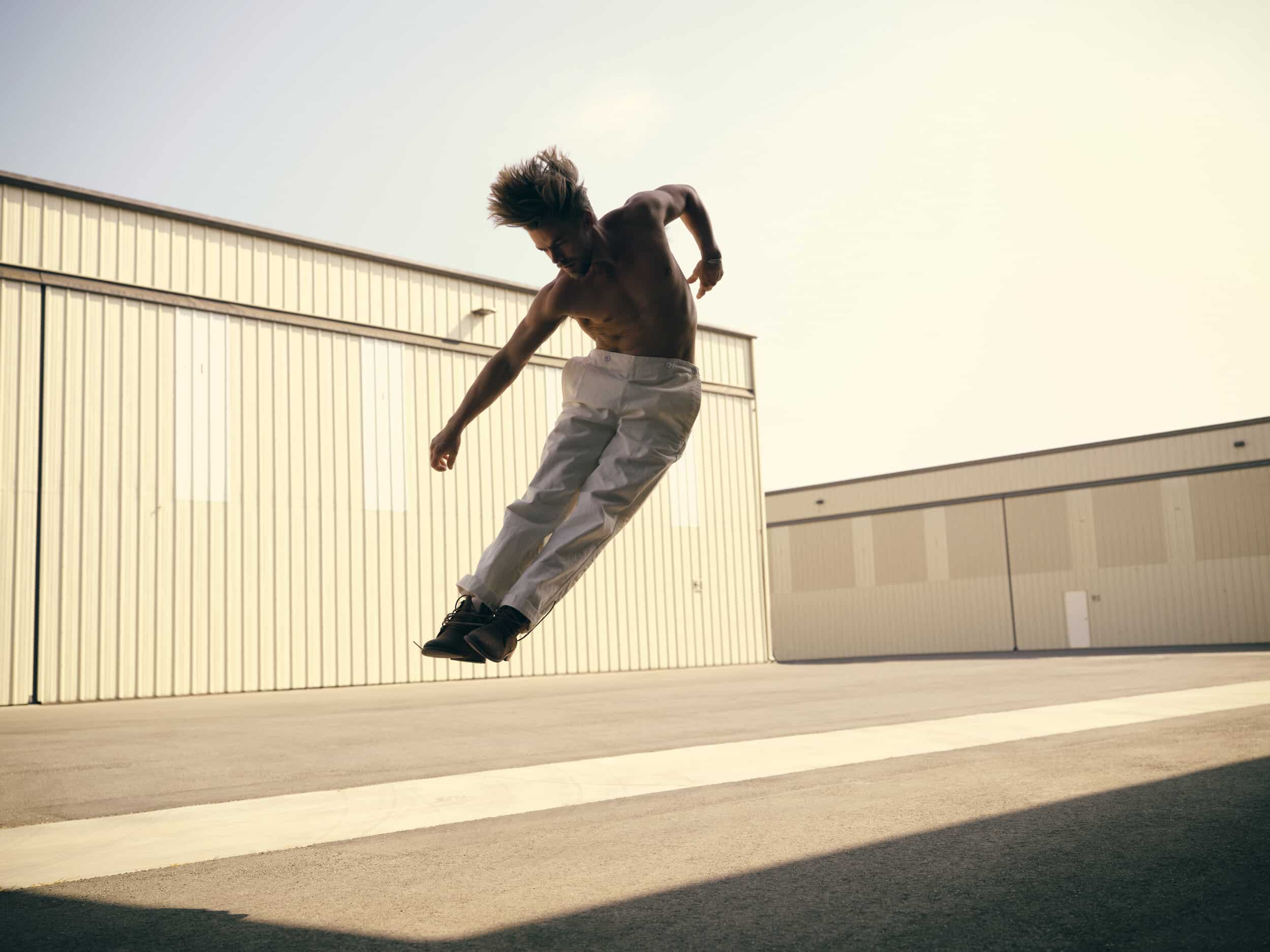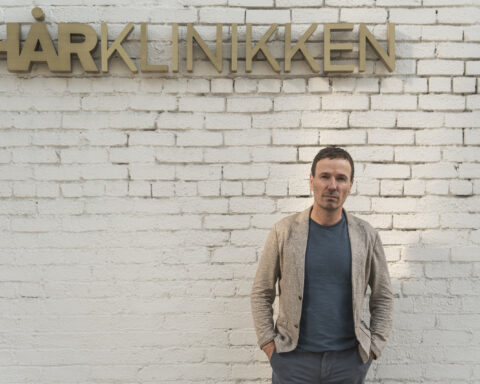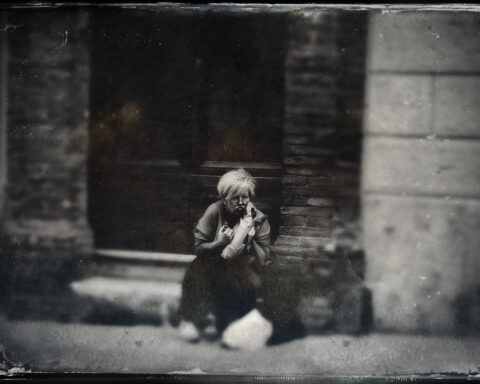Dancing is often considered a throwaway pastime, something we do after lubricating our muscles and inhibitions with a few drinks, only to try to discard the memories in the morning.
But if that quick spin and twirl made you smile in the moment, then that should be savored. And dancing can be so much more than that too — it is proven by science to be one of the healthiest things we can do for our body and mind.
Derek Hough is walking, or should that be waltzing, proof of the benefits of dance. The 35-year-old Emmy-winning professional dancer, choreographer and ‘Dancing With The Stars’ judge has the energy of a mischievous teenager, but behind the boyish demeanor he is a wise, courteous and philosophical soul.
His natural confidence and enthusiasm for life is infectious, and he’s known as one of the nicest men in the often ego-driven world of showbusiness. And he’s in great aesthetic shape, too.
It’s clear his physical and mental well-being has reaped the rewards of dedicating his life to dance since he was a schoolboy. And here he tells how dancing empowered him to overcome schoolyard bullies growing up in Salt Lake City, Utah, and helped him tap into his masculinity and tune his body and mind for success.

Derek Hough // 📸: Kurt Iswarienko for Mr Feelgood
But first, a little of the science. The complex mental coordination that dance requires, as we synchronize music and movement, has been called a “pleasure double play” by neuroscientists. Music stimulates the brain’s reward centers, while dance activates its sensory and motor circuits.
A 2018 study found dancing was the most effective exercise for maintaining physical health, beating commonly recommended activities like yoga and walking. And it has been proven to keep our brains in shape too. Scientists have found dancing helps reduce stress and improves our cognitive flexibility, confidence and memory among other mental health benefits.
And let’s tackle the elephant in the room right now, the myth that dancing is for girls. As Derek points out, try telling that to the Maasai warriors in Africa, whose powerful, tribal dance is a ritual to celebrate the rite of passage of men. Or watch Derek’s explosive Paso Doble that he performed with girlfriend Hayley Erbert on ‘Dancing With The Stars’ this week, and appreciate an athlete at the top of his game. Derek rejoined DWTS, which he won a record-breaking six times with various celebrity partners, as a judge this season. And the special performance was his first on the show since he left his role as one of the pro dancers in 2017.
So here, Derek tells Mr Feelgood about how embracing dancing, movement and simply having fun has enriched his life — and could help us all tap into our masculine, primal energy.

Derek Hough // 📸: Kurt Iswarienko for Mr Feelgood
Tell me about how your passion for dancing began?
I had four sisters and I was the only boy. And so I was dragged to dance class by my mom aged seven or eight. I did not want to go, I went kicking and screaming, but my sisters were going and I would just sit in the car in the parking lot, and my mom was like, “Well, listen, we’re here, so you might as well go in there and do something.” I was like, “Dancing is for girls.” But I went in there and had this really great coach who just made it really cool for me.
The first thing I did, before that, was play drums, and was introduced to timing and rhythm, and that helped me a lot. I immediately understood counts. I understood the choreography. So I started picking it up and was drawn to the feeling you get when you dance. And then, of course, dancing with a girl was really exciting.
And then I started competing, and that was a big part for me, as was the community part of it, as I was being bullied at school. I didn’t connect with people at school at all. But in dance, I suddenly had this community of people and friends and I had clear goals. And competing gave me the work ethic early on, to have clarity and work towards something on a weekly basis. That was a game changer for me. I just fell in love with it, with the competition side of it, the training side of it, then later with the choreography and the artistic side of it as well. And dancing has taken me all around the world several times. It has opened up opportunities and people and has been pretty extraordinary.
From a physical side of things, what does dance mean for you? What does staying fit involve and why is that important?
Dancing is extremely taxing on the body. You have to work on not just strength, but also mobility and flexibility. And you’re dancing through injuries constantly. So you just start to become aware and understand the anatomy of your body, and what it’s capable of doing, which is empowering. You suddenly have an awareness in this control over this vessel, this machine, which, by the way, isn’t a rental. This is it. This is what we’ve got for the rest of our life.
There was something for me that tapped into my masculinity, that primal energy. And that’s what I feel most aligned to, that strength within me. It’s from your cardio, from your stamina. Because that was the most difficult part when I competed, the stamina part of it, because you’ll be competing from 9am until 1am. So from a physical standpoint, dancing has made me more conscious about my health. Because, here’s the thing, I call dancers artistic athletes. You’re an athlete, you just do it in an artistic way. So I had to train like an Olympic athlete.

Derek Hough // 📸: Kurt Iswarienko for Mr Feelgood
I’m interested that you said that dance helped you tap into your masculinity, and you also mentioned that you had these problems at school. Did dance give you more confidence to help you come out of yourself as a young boy?
Absolutely. If you look at old tribes and old cultures, dancing was the foundation of rituals, community and culture. And it’s especially among the men, which is interesting. I had the privilege of being in Africa and seeing these incredible Maasai warriors doing their jumping ritual. The dance and the sounds just taps into something. It’s so powerful. You find different ways of tapping into different colors and notes, or emotions and feelings.
And just to go back a little bit too. When I was in Utah, I was bullied severely at school. I went to six different schools in a very short amount of time, because I would go to the school and get beaten up, and go to another school and get my nose broken, and then I broke another kid’s nose. I was just kind of floating and didn’t understand where I belonged. And I was a small kid, a little guy. My nickname was ‘Half Pint.’ I was like, “Why Me? Am I gravitating towards this? What am I doing? Is it how I’m acting? How I’m dressing?” But dancing, and being in that environment and having this really cool coach really helped. He would teach me a dance step, but then would also teach me life lessons about how to be a man, how to be a good person, how to treat other people and how to be a leader.
And then I went to England [to Italia Conti Academy of Theatre Arts] when I was 12 years old, and I was there for 10 years. I went first for a couple of months and then my sister [fellow celebrity dancer Julianne Hough] came too. It was crazy. We were so naive, just being kids from Utah. I literally thought London was going to have horse carriages and dirt roads. I remember landing and being like, “Wow, they have buildings and cars.” That’s how naive we were. But it was really cool. We had a very strong regimen of training and school and structure. And it gave us that clarity, and clarity is power. When I had this clarity of a goal of what I wanted to achieve, it just empowered me to to pursue that.
You must have had to grow up fast?
Yeah, which is why when I act like a kid now, I always say, “I’m making up for it.” But I wouldn’t really know what the difference would be, because that was my experience. So for me, that was just how it was. It was very hard. It took us an hour to get to school every day by train, and it’s raining and dark and cold. And it could be a bit like, “What am I doing?” But there was something about that which I loved. It was like, “I’m here to work. I’m here to achieve this goal that I have.” Even at a young age, I had a very clear, determined belief that I was going to achieve certain things. So it was hard, it was challenging, but it was fantastic. And I would never replace it.

Derek Hough // 📸: Kurt Iswarienko for Mr Feelgood
You’ve mentioned clarity a couple of times. How do you keep your mind clear? And how does dancing play into helping your mental health, and could it potentially help others too?
Where we are right now, we’re very still in our bodies. We sit down, we watch TV, we’re in our cars, we’re at work. But we’re busier in our minds than ever. So we just need to reverse that, and get busy in our bodies and move more. And for me, that quiets the mind. I often use this expression that motion equals emotion, the way you move your body affects the way you feel. And so dancing and moving — I think sometimes when we use the word dance people immediately think of ballet or something — but when you have this movement, you go to a place where your mind is quiet and focused. It’s present. Being present is a very popular word right now, but what does that mean? You could think you are being present, but on a true level you are not fully experiencing that state. And talking about masculinity, I think one of the most powerful, masculine things you can do is be present. Being fully there, fully focused on whatever that might be, a project or a person. And, for me, dancing or moving, I can absolutely do that. It forces me into the moment. Which I suppose is why it becomes almost like an addiction or an obsession. I love this feeling and I want to continue having it.
Can you tell me any more details about your regime? How do you stay in the best shape both physically and mentally?
The first and foremost thing for me is stretching and awakening the joints. So in a hot shower in the morning, I stretch a little bit just to awaken everything and to get out the kinks. I like to work out, go on runs, I’ll use a rowing machine. And I like the Echo Bike, which is a killer. I really enjoy yoga and I lift weights as well. But however you want to do it, as long as you have broken a sweat every day, then you’re alive. And a big thing for me that I advise people on, that they might not do, is icing. My girlfriend and I, we’ve taken an ice bath every single night this week. I actually asked Donald Driver, who’s a Super Bowl champion, “How did you have such a long career?” And he just said that he iced more than any of his other teammates — he was staying in there longer and he did it more consistently. And I really took that to heart because being an athlete, where your body is your tool, and your money maker if you will, longevity is so important. And so I got an ice bath where it’s 45 degrees all the time. And I get in that every night to get the inflammation down.
So recovery from a body standpoint is as important, if not more important, than the actual activity itself. If you have injuries, or aches and pains, that’s going to prevent you from being consistent. And whenever you take a break from something through an injury, the hardest part is starting back up. So to stay consistent in recovery, you can never have to get into that place where you have to ramp up, you’re just always in it.

Derek Hough // 📸: Kurt Iswarienko for Mr Feelgood
So we’ve talked about the mind and body but what about the spirit? I know the soul is a bit of a harder one to quantify, but what can dancing do for our soul? And are you a man of faith? I know you were brought up in that background.
I’m not necessarily a man of specific faith, or belong to a specific religion, or whatever it might be. But it’s interesting, I heard this story about this tribe and when they would dance, they used to say, “Olé.” And that meant they were connected to something higher, a higher power. And, of course, that got adapted to the Spanish. But what that means essentially, is that person is there, in this place where they’re connecting to something bigger than themselves. And so I’m always searching for that “olé” moment. And it doesn’t always happen, you can’t just force it. It’s just one of those things where, when you experience it, it’s amazing. And it keeps you hooked.
What would you say to men who might like dancing after a few drinks or whatever, but haven’t embraced it like a sport? Could it be something they could do, and why might it be a good idea?
Well, there’s one thing I’ll say from a social or even a relationship standpoint. I challenge any man to spontaneously grab his partner, grandma or mother and just start dancing with them a little bit. And see the smile, just watch and observe their joy. And just dancing with a person that you love, it gives you a really great sense of, dare I say, manliness. Because as men, I feel like we want to serve, we want to uplift, we want to be of importance and protectors. And so to have that ability to bring some joy in those moments, not even just for yourself but for others, is incredibly powerful. And what’s happened this past decade [on ‘Dancing With The Stars’] is awesome. I mentioned Donald Driver, and when you see these amazing athletes, Super Bowl champions, World Series champions, Olympians, people from all over all over the sports world dance, and they say, “Wow, this is not what I thought it was. This is something so much more.”
It taps into something that we all have inside. When you look at like a toddler, before they can walk or crawl, you turn on music and they’re bouncing. Nobody taught them to do that. It came from them. I think we all have that and along the way you can sort of unlearn that instinct to move our bodies. And that’s why, especially men, we’re like, “Well, let me have 20 drinks, and then I’ll move.” But it’s actually very natural to move. So don’t be afraid of it. Embrace it.

Derek Hough // 📸: Kurt Iswarienko for Mr Feelgood
This reminds me of something I read recently about the power of play. That as a youngster, you have a lot of creativity inside of you — and you’re very lucky to have gone down a creative path in your life — but for a lot of people that is knocked out of them over the years by life. And that reconnecting with that sense of fun and play is very important.
Absolutely. I think there’s a fear of, “Will people take me seriously? Or am I just a joke?” But the truth is, I think that when you see somebody being playful, when you see somebody being joyful, you’re like, “Man, I want to get in on that.”
We should all stop and think, “What are my priorities in my life, and what’s the order of them?” Because you can have your priorities, but the order is important. And what I realized when I was going through this in my mind, was my health was number one, because if you don’t have your health, then you can’t have your energy for your relationships, for your business, for all these different things. And then honestly, in the top five was fun and play. We think of them as throwaway values. But when you make them a priority, you start being more focused on having more fun and it just enriches your life. So give yourself permission to have fun.
And finally, I know mental health is very important to you, and you released a single a few years ago, ‘Hold On’, that was quite directly about that. What are your thoughts on men talking to each other about these issues and why that is important?
It’s a tragedy that some men don’t feel like they’re allowed to express themselves, or talk about the way they feel and show vulnerability. The most courageous thing to do is be vulnerable and to talk about the way you feel. And it’s tough man, I totally get it, because, again, we want to be the protectors, and so we fear that if we are asking for help, or we need help, that we’re suddenly weak. And I can definitely relate to that, for so many years not asking for help, not asking for some guidance, and thinking, “I should just be able to figure this out myself. I need to man up, and be a man just get on with it.” And then you realize that’s quite a cowardly thought and the courageous, masculine approach is to be open and to and to not be afraid to ask and seek help. And I feel like there’s been a lot more attention on that recently, which I’m happy to see.











